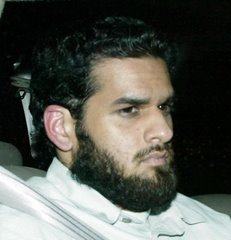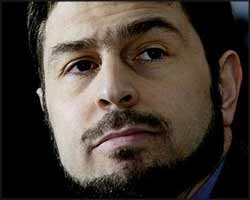 A Canadian judge today struck down a key clause in Canada's primary "anti-terror" law, on the grounds that it infringes on freedom of religion, thought and association in violation of Canada's Charter of Rights and Freedoms and is therefore unconstitutional.
A Canadian judge today struck down a key clause in Canada's primary "anti-terror" law, on the grounds that it infringes on freedom of religion, thought and association in violation of Canada's Charter of Rights and Freedoms and is therefore unconstitutional. This marks the second time in less than a week that portions of the Canadian government's "anti-terror" legislation have been struck down.
Justice Douglas Rutherford of Ontario Superior Court, after hearing a challenge brought by suspected terrorist Mohammed Momin Khawaja, ruled against a section of the law that defines terrorism in terms of ideological, religious or politicial motivation.
According to a Canadian Press report published by the Toronto Star,
Rutherford, in a 32-page written decision, zeroed in on the provision that makes proof of terrorism dependent on showing a religious, political or ideological motive for the criminal activity.An article from the Associated Press published by the International Herald Tribune reports:
He wrote that this definition is “an essential element that is not only novel in Canadian law, but the impact of which constitutes an infringement of certain fundamental freedoms ... including those of religion, thought, belief, opinion, expression and association.”
Such an infringement, said Rutherford, “cannot be justified in a free and democratic society.”
Khawaja's lawyer, Lawrence Greenspon, said the ruling strikes to the core of the law.Canada dot Com reports:
"The motive clause is at the heart of the anti-terror law; that clause has been struck down," he said.
Last week, an Ontario court struck down sections of Canada’s secrecy law in throwing out RCMP warrants used to search Ottawa Citizen reporter Juliet O’Neill’s home.O'Neill had been reporting on the case of Maher Arar
 , who was detained by American authorities, sent to Syria and tortured there. Canadian security forces have been squirming lately in an attempt to distance themselves from the "extraordinary rendition" of Maher Arar, although it does look very much as if they were complicit in the event.
, who was detained by American authorities, sent to Syria and tortured there. Canadian security forces have been squirming lately in an attempt to distance themselves from the "extraordinary rendition" of Maher Arar, although it does look very much as if they were complicit in the event.As for Khawaja, he is charged with being involved in an alleged British bombing plot which allegedly also included Omar Khyam, who refused to testify in a British court last month after members of the Pakistani intelligence service, ISI, threatened his family in Pakistan. Another suspect in the case, Anthony Garcia, has testified that he wanted to go to Pakistan for military training.
As mentioned last month in connection with these events, the contradictions here are enough to make your head spin -- if you believe the "official cover story". In other words, if you accept the premise that ISI are a strong ally of the USA in the "War on Terror" and al-Q'aeda are the enemy, it could be difficult to understand why ISI agents would try to prevent al-Q'aeda suspects from testifying. But once you begin to understand -- what is becoming increasingly obvious -- that ISI and al-Q are two sides of the same coin, the matter becomes more and more transparent.
Did you happen to notice that both Arar and Khawaja are software developers who were working on contracts with the Canadian government? And does that raise any odd flags? Hmmm... Just wondering.
Meanwhile, back at the ranch, CBC reports:
Mark Holland, an Ontario Liberal MP and a member of the House of Commons standing committee on public safety and national security, said the section of the act struck down wasn't the most important part.Well, of course! There must be dozens of parts of the anti-terrorism law more important than the definition of terrorism!
The committee is already reviewing the Anti-Terrorism Act, Holland said, and will have to revisit the section struck down.Of course it's difficult to understand, Mr. Holland. Why would anyone want to do Canada harm? I can't imagine any reason at all, unless you consider the fact that Canadian troops are waging a thoroughly unjustified war in Afghanistan!
"We will have to go back to that definition and refocus it. We need a definition that is more acceptable to the courts," he said.
"Motivation is a very difficult thing for us because it is difficult for us to understand why someone would want to do us harm."
From the IHT:
[Khawaja] has been tied to an alleged Islamic terrorist gang that plotted attacks against Britain's electricity supply network, pubs, nightclubs and trains, according to British prosecutor David Waters. He said Khawaja was an accomplice who carried out a "great deal of preparation" for the gang, whose alleged attacks were foiled in March.Methinks the British prosecutor doth go way too far, considering previous admissions that the so-called suspects hadn't even selected a so-called target.
A few further comments may be germane here.
In the case of Juliet O'Neill
 , where secrecy provisions were declared unconstitutional, there was a very strong reaction from the forces of freedom.
, where secrecy provisions were declared unconstitutional, there was a very strong reaction from the forces of freedom.As the Globe And Mail reported:
University of Ottawa law professor David Paciocco, who helped represent Ms. O'Neill and the Citizen in court, said in an interview that the ruling is a victory of global scope.And the ruling itself was also very powerful.
“The long and short of it is that this decision has potential relevance not only to historical research, but for countries internationally who deal with control of information by their governments,” Prof. Paciocco said.
“Even if the judge had not found that there was an abuse of process, this would be an indictment of the excessive reach of the security mentality that followed 9/11. It should chasten any police force from looking at journalists as the subject of an investigation.”
In her ruling, Judge Ratushny said that so-called anti-leakage provisions in the Security of Information Act are extremely vague, too broad and wide open to flagrant misuse. She said that they “endanger the life, liberty and security of the person” in direct violation of Section 7 of the Charter of Rights.I don't have a copy of today's ruling yet but I will try to keep you posted. Meanwhile, as the Toronto Star reports, the whole so-called anti-terror law was unnecessary in any case:
“In their present state, the impugned sections give the state the ability to arbitrarily protect whatever information it chooses to classify as ‘secret official' or ‘official' or unauthorized for disclosure - and to punish by way of a criminal offence those ‘speakers,' ‘receivers' and ‘listeners' who come within that protected sphere.
“This is legislation that fails to define in any way the scope of what it protects and then, using the most extreme form of government control, criminalizes the conduct of those who communicate and receive government information that falls within its unlimited scope including the conduct of government officials and members of the public and of the press.”
Greenspon argued that pre-existing Criminal Code provisions could have covered all Khawaja’s alleged activities.So once again, the legislation itself is incomprehensible, unless, of course, both the definition of terrorism struck down today and the secrecy provisions struck down last week were aimed at something other than terrorism.
Hmmm... Just wondering.